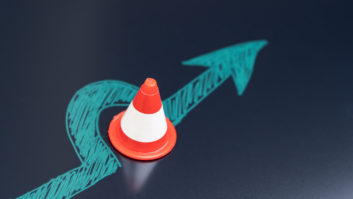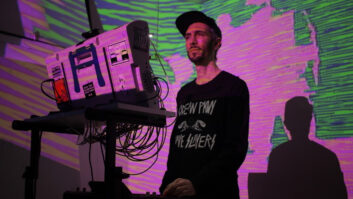The music industry, renewing its effort to control the recording of digital radio broadcasts, wants Congress to grant authority to the Federal Communications Commission (FCC) to impose copy-protection regulations on the satellite and terrestrial digital-radio industries.
The Recording Industry Association of America (RIAA) didn’t expect the House and Senate Commerce committees to include the proposal last week in proposed legislation to set a date for turning off analog-TV channels and auctioning off the analog spectrum. Nonetheless, an RIAA spokesman expected digital-radio copying restrictions to be approved before the year is out, potentially as part of digital-TV copy-protection legislation or as a stand-alone bill.
“We’re trying to prevent cherry picking and library-ing that turns a passive listening experience into an interactive download service, no matter what the platform,” the spokesman said of the latest music-industry effort. The effort is backed by a coalition of groups that includes 20 industry associations and companies ranging from the RIAA to the Songwriters Guild of America (SGA) and National Association of Recording Merchandisers (NARM).
Any rules adopted by the FCC, the RIAA contended, won’t force more than 6 million satellite-radio subscribers to junk their existing satellite radios to continue receiving service. RIAA was less sure about existing HD Radio receivers. HD Radio inventor iBiquity was unavailable for comment.
The music industry is lobbying Congress, the RIAA spokesman said, because a federal court ruled earlier this year that the FCC lacks the authority to control the copying of digital-TV content.
In one draft of legislation submitted by the RIAA to Congress, the association asks Congress to grant the FCC the authority to:
- require encryption of HD Radio broadcasts at the source to implement usage rules;
- and require satellite radio broadcasters to encrypt their signals, as they already do, to implement usage rules.
In addition, the draft also specifies the rules that must be implemented if the FCC chooses to mandate copy protection regulations. Under the draft, for example, consumers would be able to record specific programs, channels, or time periods, but each recording must be 30 minutes or longer.
Also, the draft rules would:
- prohibit recording “based on information concerning specific sound recordings, artists, genres or other user preferences;”
- prohibit the “automated disaggregation of the copyrighted material contained in any recording of a transmission program;”
- and prohibit the “exporting or redistribution of recorded material from the device by digital outputs or removable media.”
The music industry needs the digital-radio legislation, opposed by CEA as overly broad, because record companies and performers don’t get compensated under existing copyright law for terrestrial radio broadcasts, the RIAA spokesman said. With no performance rights to sound recordings delivered by terrestrial broadcasters, the RIAA explained, record companies and artists lack the ability to withhold content from broadcasters to force copy-protection negotiations with technology companies.
Music companies and artists had that leverage when they negotiated copy-protection technologies and rules for the failed DVD-Audio and SACD formats, the RIAA noted.
“We don’t get paid for over-the-air radio,” the spokesman said. “Therefore, we can’t have [over-the-air radio] substitute for a sale.”
Although music companies and artists worked out compensation deals with satellite radio broadcasters under laws passed in 1995 and 1998, the music industry wants radio copy-control legislation extended to satellite radio “to be fair,” the spokesman said.
To prevent time-shifting digital radios from turning into sales-shifting radios, the music industry wants the FCC to require digital radio broadcasts to be encrypted at the source and usage rules embedded in radios, the spokesman continued. Neither technology will make existing HD Radios or satellite radios obsolete, the RIAA contended. Existing satellite radios, which already receive encrypted transmissions, will continue to operate, and usage rules might even be downloaded into existing radios to make them comply with the proposed regulations, RIAA said. Existing HD Radio receivers might be able to receive future encrypted broadcasts and comply with usage rules through an over-the-air upgrade, RIAA added.
Any FCC rulemaking on copyright protection would be separate from the FCC’s approval of final operational rules for HD Radio and wouldn’t delay that approval, the RIAA also contended.
“We don’t have a problem with TiVo-like time-shifting or manually hitting the record button to record a song as you listen, or programming it to record from 3 to 5 p.m.” the RIAA said. “Anything over 30 minutes, we want tons of flexibility.” The industry “wants to keep radio radio but give consumers new flexibility and services they never had with [analog] radio,” he said.
What the industry opposes, he added, is “permanent storage of a song unless there’s a buy button.” A buy button represents a “new business model” offering the potential for revenue sharing with broadcasters and hardware makers.
CEA is unimpressed with the music industry’s assertions that consumers will get new options that they didn’t have before. The music industry is serving up draft language offering “a broad interpretation of redistribution,” said CEA’s spokesman Jeff Joseph. “The only intent [of the digital TV broadcast flag proposal] was to prevent redistribution over the Internet,” he pointed out.
Joseph also worries that encrypted transmissions wouldn’t be playable through legacy devices connected to a home network.













